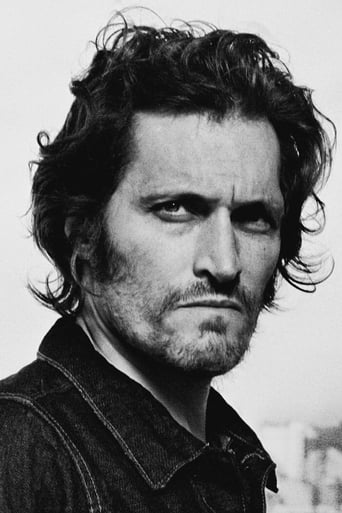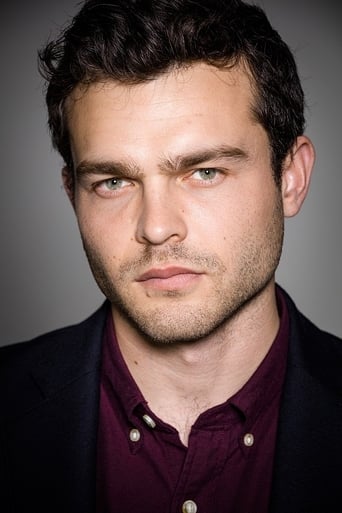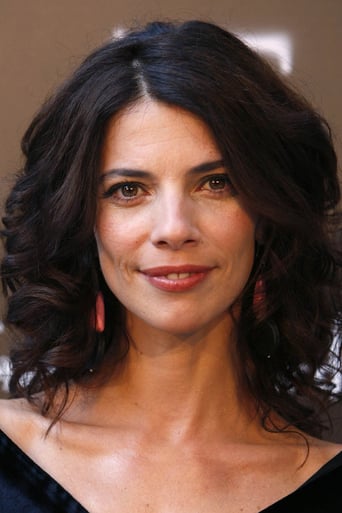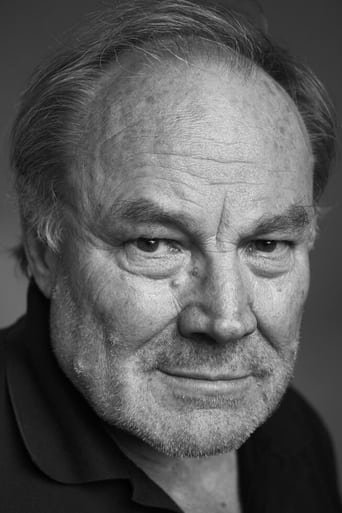GrimPrecise
I'll tell you why so serious
VeteranLight
I don't have all the words right now but this film is a work of art.
Voxitype
Good films always raise compelling questions, whether the format is fiction or documentary fact.
Scarlet
The film never slows down or bores, plunging from one harrowing sequence to the next.
Wuchak
Released in 2009 and directed by Francis Ford Coppola, "Tetro" is drama about two American brothers in Buenos Aires, Argintina. The younger one, Bennie (Alden Ehrenreich), idolizes the older, Tetro (Vincent Gallo), and hasn't seen him in a dozen years because he mysteriously cut all ties with the family and moved to Argentina, where he lives with his girlfriend, Miranda (Maribel Verdú). Bennie discovers his brother's near-finished play and is obsessed with completing it without his permission, perhaps because he senses it holds the answers he seeks. Klaus Maria Brandauer plays the arrogant conductor father while cutie Sofía Gala is on hand as a young Argentinan girl that fancies Bennie. The movie is primarily in B&W, but with color flashbacks."Tetro" is an artful and somewhat hypnotic adult-oriented drama by the master filmmaker, the very opposite of conventional Hollywood blockbusters. Ehrenreich is reminiscent of Leonardo DiCaprio when he was young while Gallo is broodingly charismatic as the eponymous protagonist. Coppola has always had a good eye for female cast and "Tetro" delivers the goods with Verdú and Gala, although I wish the latter had more screen time. There's a revelation at the end that I failed to anticipate, but should have because everything in the story points to it.Francis said at the Cannes film festival that "nothing in (the movie) happened, but it's all true." In other words, the film's autobiographical in some ways. The challenge is to perceive the parallels. Two are obvious seeing as how Coppola's father was a famous conductor. The other is when South America's most honored critic asks Tetro if her opinion matters to him anymore and he honestly says it doesn't; sticking her nose in the air, she silently walks away. Like Tetro, Coppola no longer cares what critics think of his works. It's akin to Kurtz' disposition toward the pathetic brass in "Apocalypse Now." The critic's name in the film is fittingly "Alone," played by Carmen Maura. Then there's the fact that Francis has a brother he's been known to have a love/hate relationship with, not to mention how his nephew, Nicolas Cage, is a little reminiscent of the titular character. But none of this speculation really matters; all that matter is that "Tetro" is a creative, operatic, entertaining drama. But stay away if you need constant 'exciting' things going on, like explosions, absurd action scenes and the corresponding CGI (not that there's anything wrong with that, lol).The film runs 127 minutes and was shot in Buenos Aires & the Andes, Argentina with studio work done in Spain.GRADE: B
Terrell Howell (KnightsofNi11)
Francis Ford Coppola never really got it back after his incredibly successful run of films in the 70's. Ever since Apocalypse Now in 1979 he's released things that range from absolutely awful to pretty good. There has been nothing that can even compare to his earliest works of pure genius. But in every range of data there are outliers. Tetro is the outlier in this situation. You can't expect The Godfather going in, and if you don't then you are actually treated to a very good film. Vincent Gallo stars as Tetro and Alden Ehrenreich plays his brother, Bennie. Bennie is visiting his estranged brother in Buenos Aires in order to revamp their relationship. The film tells a story that is as brutal as it is touching, telling of all the hardships these two brothers must endure to find peace with each other and become brothers once again.What Coppola has done here is a very risky and fascinating move for a director of his stature. He's attempted to revert back to an independent art house style of filmmaking. Tetro is an incredibly artistic film that captures a surreal beauty in its glorious black and white cinematography. An arbitrarily unique style of lighting is used here to create a very dream like and imaginative atmosphere. Watching this film is mystifying in a way. It has a certain hypnotic power to it that has a very strong allure. Tetro's immaculate visual quality is something that draws you in whether you have an interest in the content of the story or not.However, chances are you will have some interest in the intriguing plot of this film. The story that develops between these two brothers is fascinating and compelling, and told in such a way that reality is blended with fantasy and we are never entirely sure of what is going on. There is deep subtext under the surface of Tetro, and this is something that is interesting to read past the already interesting surface story. The two leads give it their all when playing their compelling characters and, although we never develop a strong connection to them, we are still fascinated by the story they have to tell.Tetro is a beautiful film and Coppola has surely outdone himself after a run of such mediocre films. This is one I can say I truly enjoyed and felt deeply moved and fascinated by this immaculate film. It is a strange film that isn't put together perfectly, but the bizarre and chaotic patterns of the film make it work in a unique way. I definitely don't regret watching this film.
gradyharp
Francis For Coppola has created a major cinematic miracle in his TETRO. The film is hauntingly beautiful to see, to hear, and to challenge the minds of the viewers. This is what great cinema is all about - taking the risks of storytelling to the impossible extremes available to only the great writer/directors such as Federico Fellini, Alain Resnais, Alexander Sokurov, François Truffaut, Jean Renoir, Akira Kurosawa, Ingmar Bergman, and Luis Buñuel. Heady company, this, but Coppola rises to the occasion with this multilayered exploration of family secrets and the dissection of the concept of 'genius' - all in the quiet guise of autobiographical references that make this work more than simply one of his many successful films. He has the grace to select artists of his own caliber to assist him: the cinematography (as complex a marriage of rich black and white and stunning color as anyone has achieved) is by Mihai Malaimare, Jr.; the musical score is by the brilliant Argentinean composer Osvaldo Golijov whose atmospheric compositions mesh perfectly with the influential moments of Puccini, Brahms, Offenbach, and Delibes; and a group of actors whose range of talent spans decades of experience and levels of finesse. It all works to one end, and that end is a celebration of a master's art of making memorable film. The setting is Buenos Aires where Tetro (Vincent Gallo), a writer of plays and novels, all incomplete and written in code and confusing manner - never having published any of his output, lives with Miranda (the brilliant Maribel Verdú), a doctor at the 'insane asylum' where she met Tetro as her patient. Into this shadowy place steps Benjamin (Alden Ehrenreich) who has run away from military school and is working as a waiter on a cruise ship docked in Buenos Aires for repairs. Benjamin seeks out his half brother Angelo (Tetro's discarded name) to try to find out about his confusing and dysfunctional family. Benjamin worships his older brother who taught him all the important aspects of art and life before Tetro disappeared, shunning the family that birthed him. Miranda convinces Tetro to allow Benjamin to stay with them despite the fact that Benjamin represents the family he deserted. Benjamin discovers the writings of his brother and manages to de-code them and writes an ending for a play that Tetro never finished. The play is produced by a small but adventuresome theater run by one Jose (Rodrigo De la Serna) and enacted by Abelardo (Mike Amigorena) and Josefina (Leticia Brédice). Upon hearing this Tetro is enraged and begins to relate the truth about the family that produced both boys - crux of which is the father figure Carlo Tetracini (Klaus Maria Brandauer) who sole claim to 'genius' in the family is his power as one of the most revered orchestral and opera conductors in the world. The remainder of this complex story unwinds the secrets long held within the family and the truths discovered by Benjamin alter his life and his perception of family and love and commitment. Many of the secretive portions of the story are revealed not only in flashbacks of the family, but also in full color dance and theater sequences focusing on 'Coppelia' and 'Tales of Hoffmann', subtle suggestions to the audience of the truths yet put into words by the actors. These sidebars are brilliantly executed and designed and performed and beg for more time on the screen. If the last portion of the film is a bit slow (a flaw comfortably corrected by the presence of the great Carmen Maura as the preeminent judge of taste and talent who goes by the symbolic name of 'Alone'), this gives the audience time to assimilate all of the information that has been inexorably revealed throughout the course of the film. TETRO is film-making at its finest. It demands much from the audience, but its rewards are considerable. Highly recommended. Grady Harp
mark s
I've walked out of two theater movies to date. The first was "Bean" in 1997. This was the second.All acting aside, the script for this movie was terrible. Dialogue was frequently cliché, and irrelevant details abounded, leaving big questions about character motivation unanswered -- characters weren't fully developed, as hard as they tried to be. Final editing was poor, as the film was pieced together strangely. The reoccurring nudity was tasteless, pointless, weird, and ultimately what caused the final offense.I am usually a fan of Art House, but I am not a fan of Art House for Art House's sake. This is what Ghost World refers to as "The Flower That Drank the Moon".







